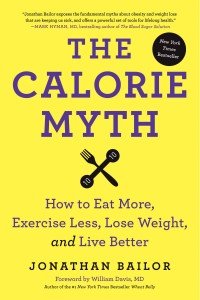Exercise and Diet Myth of Calories
The biggest exercise and diet myth you will ever hear is that energy in equals energy out. Stated a different way, calories in equals calories out. The premise is that if these two are equal then burning the same amount of calories that you eat daily will result in maintenance of weight. This is a concept that has been preached for numerous years. However, when put to the test, it has not with stood the test of time.
How the Exercise and Diet Myth Mislead You
A calorie is a calorie. At least that is what you are supposed to believe. I am so surprised when I hear educated nutrition professionals make this statement. In a controlled experimental setting a calorie equals a calorie. The amount of energy derived from that calorie is the same regardless of the source. However this negates the other affects that the source of the calorie has. As a result, our body is not an experimental setting. Rather, we are complex and respond to the foods that we take in differently. We don’t respond to each type of food the same. The effect of eating 12 grams of sugar is not the same as eating 12 grams of beef, or protein. So is a calorie a calorie? All calories are the same only in theory, not in application.
What the Exercise and Diet Myth does not tell you
Now that you know a calorie is not a calorie, you need to understand why. This may initially seem confusing. If a calorie, regardless of the source, gives off the same amount of heat, or in our case energy, then why does it matter where is comes from? In the example that I gave previously of 12 grams of sugar (carbohydrate) and 12 grams of beef (protein), each provide the same amount of calories. From each source you get 48 calories (kcal). Yet there is one significant effect of the each of these sources of food that is being neglected. Each food source has a unique hormonal response that drastically alters the way that calories are used. Sugars are going to increase the production of insulin. In contrast, proteins do not cause significant insulin stimulation. Insulin is a hormone that promotes storage. Therefore, when carbohydrates are ingested insulin is released and storage of sugar (glucose) increases. If it is consumed above a useable amount, this is stored as fat. So while the consumption of only 12 grams of carbohydrate or protein might not have a significant difference, the same cannot be said when you consider the volume of food that is consumed on a daily basis.
Let’s apply some logic to this argument. Forget the science for a minute. The “calorie is a calorie” concept assumes that all foods are the same, regardless of the source. Therefore, if you eat 200 calories from sugar or 200 calories from vegetables or 200 calories from protein it does not matter. Ask yourself if this even makes sense. Of course it does not. You notice a difference in the way you feel after eating these different foods. Carbohydrates leave the stomach quicker than proteins leaving you hungry again in a short period of time. Proteins on the other hand tend to sit heavier and end up increasing our metabolism. Logic tells us that a calorie is not a calorie so don’t fall for the exercise and diet myth that energy in equals energy out.
The Exercise and Diet Myth Stops Weight Loss
The exercise and diet myth of energy in equals energy out is even more pronounced in the average population. Worse yet, most of those that care about losing weight are going to be the ones focused on calories. You have seen these folks if you have been to the gym. They are the ones on the treadmill or bike trying to burn a particular number of calories. Unfortunately, these are the same individuals that feel betrayed when they reduce the number of total calories they take in, increase their exercise and still don’t lose weight. Weight loss is not difficult when you follow proven concepts. However the idea of a calorie in equals a calorie out is not effective in the real world where other factors such as hormones have to be considered.
Beyond the Exercise and Diet Myth
It is time for you to break the restraints of antiquated exercise and diet myths. What was once considered the best approach to weight loss or maintenance is now questionable at best. Just ask yourself, why did diets such as Atkins and South Beach become so popular and work for so many? It is not because they promoted the exercise and diet myth of a calorie in equals a calorie out. Rather they focused on particular foods for not just the caloric content, but moreover the metabolic effects. While I am not promoting these diets and would rather see someone consume a more balanced diet with multiple foods to fit their needs such as in the Paleo Diet, the concept of using food for its metabolic effects carries more weight than the total caloric value of the food.


Leave a Reply